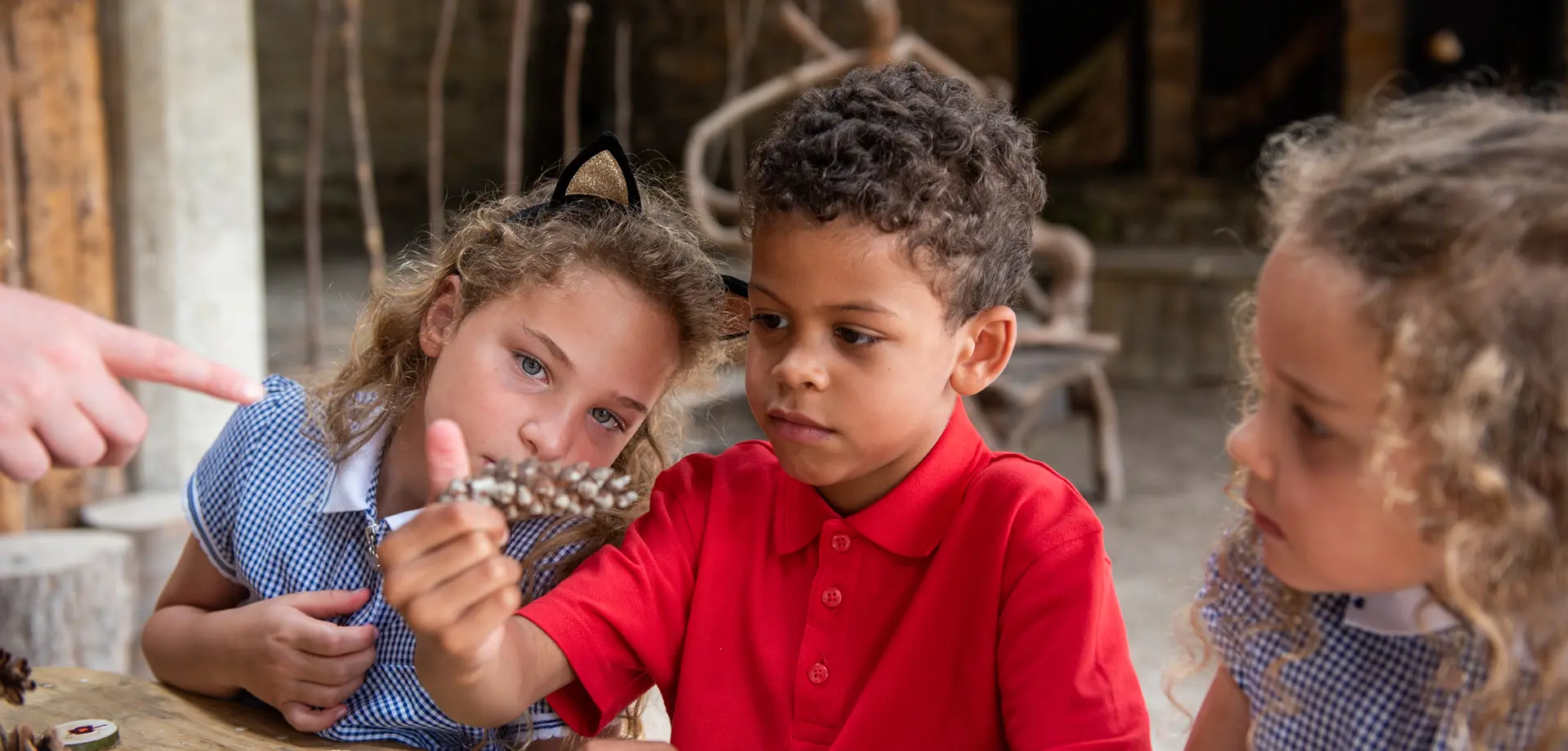Visit Chatsworth
We'd love to welcome you and your pupils to Chatsworth to support your classroom learning.
Explore the house, garden and/or farmyard, or enhance your visit with our guided learning sessions. These sessions are hands-on and meet a broad range of needs and learning styles.
Explore our guided learning sessions
All sessions are 90 minutes unless otherwise noted.
- 1. Get to know trees
-
£2 per pupil | Visit must include the garden
During this session we will be exploring the wonderful world of trees in the garden and Stand Wood. We will understand why trees are so important to us and get to know some native and non-native species. Pupils will work out how old a tree is and how tall it is. Using simple keys we will identify different species using leaf shape and bark.
We will listen to trees and be able to name all the parts of a tree including roots, trunk, bark, branches, leaves, buds, seeds and fruit.
We will consider how a tree is a very important habitat and how many species rely on that tree for survival.
Curriculum links: similarities and differences, understanding the world, making observations about trees and animals and taking about changes
- 2. Kitchen garden & farmyard explorer - Finding out about food
-
£4 per pupil | Visit must include the garden and farmyard
During these two 90-minute sessions pupils will spend time in both the kitchen garden and farmyard learning about lifecycles of plants and animals.
Kitchen Garden
In the kitchen garden we will observe vegetables and fruits growing and find out whether the part we eat is above or below ground. We will discuss growing plants from seeds and seasonality and how climate impacts growing produce.
We will find out a plants requirements for growth (air, light, water, nutrients from soil, and room to grow) and investigate the importance of soil and why we need to look after it. We will consider the idea that plants also need nutrients and that they get these from the soil.
We will explore the cutting flower garden and identify all the parts of a flower and spot pollinators on the way. We will discuss how important pollinators are to the garden.
We will consider how the garden is sustainable and where the fruit, vegetables and flowers are used at Chatsworth.
Pupils will get the opportunity to taste produce from the garden.
Farmyard
The session will be exploring the farmyard learning about the life cycles of our farm animals. On the tour pupils will meet horses, pigs, sheep and hens. During the visit children will have the opportunity to handle/touch some of the animals.
During the session we will introduce pupils to the topic of farm welfare, where food comes from, the needs of the farm animals and how we look after them.
Pupils will learn how farming has changed over the years and how the farmyard at Chatsworth is home to some rare breeds and how important they are to our history.
Curriculum links: similarities and differences, understanding the world, making observations about plants and animals and taking about changes
- 3. Little farmers animal experience
-
£2 per pupil | Visit must include the farmyard
A 40-minute session learning how to care for three small animals. This session is only available during term time between March and July.
Curriculum links: science
- 4. Perfect pollinators & fabulous flowers
-
£2 per pupil | Visit must include the garden
For this session, available April to September, we will explore the Kitchen Garden, orchard and wild flower areas within the gardens. We will discuss pollination and how this works and why it is so vitally important for our world. Pupils will learn about pollinators including bees, butterflies, beetles, wasps, moths, hoverflies, flies, and spiders and use simple keys to identify different species.
We will look at parts of bee – head, thorax and abdomen and understand how they gather food, protect themselves and what is a good habitat for them. We will also consider the challenges bees face in the modern world.
During our walk we will learn how flowers attract pollinators with colour and fragrance whilst looking and understanding the basic structure of a plant.
Pupils will make observations of animals and plants and explain why some things occur, and talk about changes.
Curriculum links: similarities and differences, understanding the world, making observations about plants and animals and taking about changes
- 5. Seasonal habitat safari
-
£2 per pupil | Visit must include the garden
Explore different habitats including woodland, water, wildflower areas and gardens. Learn how the seasons affect plants and animals and how the day length varies.
Spring
Spot the signs of spring, days getting longer, weather warming, buds on trees, spring flowers, nesting birds, colours and sounds.Summer
Long days, warm weather, flowers, green leaves, bees, butterflies, dragonflies, fruits and berries.Autumn
Days getting shorter, cooler weather, autumn colours and crunchy leaves. Learn about animals that hibernate and how they prepare for winter.Dependent on the season the activities could include; completing a spotter sheet, using binoculars to spot wildlife, using a magnifying glass to identify different plant and tree species, using stethoscopes to listen to trees, learning to use simple keys, rolling logs for mini beasts and creating natural art.
Curriculum Links: similarities and differences, understanding the world, making observations about plants and animals and taking about changes
- 6. Sensory nature trail
-
£2 per pupil | Visit must include the garden
Exploring the landscape pupils will use their sight, hearing, smell, touch and taste as appropriate, and make and record observations.
Pupils will look at similarities and differences in relation to different habitats, objects, materials and living things as they explore. They will make observations of animals and plants and explain why some things occur, and talk about changes.
Listening
Pupils will learn why certain animals have larger ears and how they need to hear really well to find food and to protect themselves. We will listen to trees using stethoscopes to hear gurgling and moisture.Touching
Pupils can try barefoot walking and paddle in the trout stream. We will also feel different textures of trees and describe these. We will look for spiders and pond skaters on the water to learn how they feel vibrations with their feet to catch food.Tasting
We will explore the kitchen garden looking for pollinators feeding and try to spot a butterfly feeding on nectar and observe bumblebees collecting pollen. Pupils will get the opportunity to taste some different herbs.Smelling
During our walk we will use our sense of smell with all the flowers and plants we identify. We will learn how animals use their sense of smell to stay safe, find food and explore the world around them.Seeing
We will finish our walk using binoculars to look at fabulous views from the Chatsworth gardens and see what the pupils can spot in the landscape. We will consider why some animals and birds have big eyes such as owls and how predators need amazing sight.Curriculum links: similarities and differences, understanding the world, making observations about plants and animals and taking about changes
- 7. Tractor & trailer tour
-
£2 per pupil | Visit must include the farmyard
A 30-minute tractor and trailer tour through the Chatsworth parkland learning about the animals who make the park their home and the people who look after it. Full commentary will be given by the driver about the sheep (and lambs during lambing season) and farming on the estate. Other animals you may see are cows and the two types of deer we have on the estate.
The trailer has lap belts, a ramp and wheelchair clamping facility.
Curriculum links: science
Plan your learning visit
Pricing, booking forms and more
Activity sheets and downloads
Craft ideas, activity sheets, templates and more designed for teachers and families, and available for free.
Farmyard Christmas experience
Treat pupils to Christmas themed story time, crafts and a chance to meet our friendly farmyard animals.
Keep in touch
For more information about our learning sessions and to discuss curriculum links, email us at education@chatsworth.org or call us on 01246 565430 between 9am and 5.30pm Monday to Friday.
Follow Learning at Chatsworth on Facebook or sign up to our newsletter.





